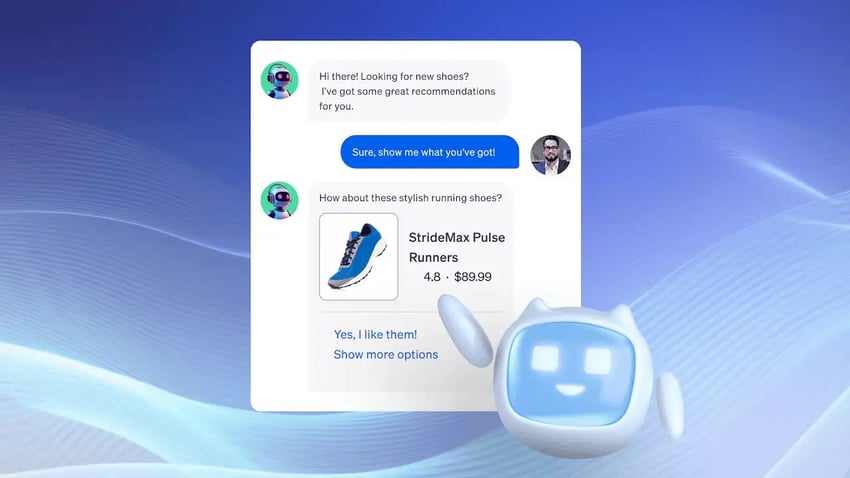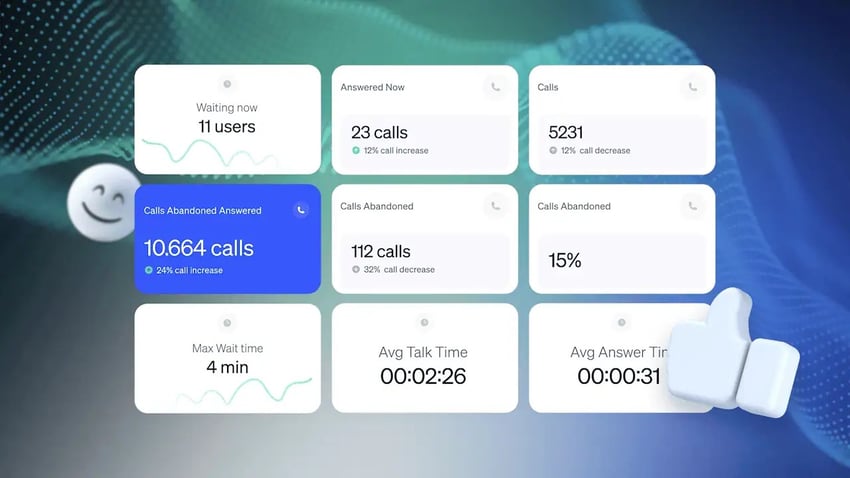Call center agents struggle with frustrated customers and complex technical issues. Continuous and effective call center training is key to successfully addressing these challenges and working in a call center. Your call center agents need appropriate training to resolve and de-escalate customer issues, navigate difficult conversations with dissatisfied customers, and achieve superior productivity.
We’ve compiled this best-practice guide for call center leaders, managers, and agents alike to highlight the insights and strategies for an effective call center training program that works for everyone, improves your call center’s performance with higher-quality assurance, and delivers a more positive customer experience.
What Is Call Center Training?
Call center training is a structured program that companies follow to prepare teams for real-world customer interactions. It equips learners with the right skills, awareness, and tools to handle customer calls effectively, which includes product knowledge, company policies, communication techniques, and software proficiency.
Good call center training enhances agents’ confidence, problem-solving abilities, customer service skills, and precision in delivering high-quality support. It’s an investment for both your agents and business, which improves knowledge management and customer relationships and drives business success.
Why Is Call Center Training Important?
While handling customer inquiries and resolving their issues, your agents risk heavy stress if they’re not adequately trained. With reduced stress, your agents can respond to customer needs and resolve their issues quickly.
Increases agent confidence and reduces stress
Proper agent training gives agents the confidence to handle complex calls so they don’t feel overwhelmed. Without it, many struggle; in fact, in a survey of 2,100 contact center agents, 87% of call center agents report high stress levels, and 60% feel their training isn’t adequate. When employees know exactly what’s expected and have the skills to meet those expectations, their stress levels drop, morale rises, employee engagement improves, and they stay motivated on the job.
Enhances productivity and efficiency
A well-trained team works faster and smarter. Agent training helps employees understand workflows, master call-handling software, and resolve issues on the first contact, which improves first-call resolution (FCR) rates. Using AI-powered tools can further optimize performance. When everyone knows how to use tools and follow processes correctly, calls flow smoothly, customers wait less, and the customer service operation runs better.
Reduces employee turnover
High turnover is one of the biggest challenges in call center operations, and poor training is usually a root cause. When employees are unprepared or unsupported, burnout follows. Structured training programs show agents that the company values their growth through professional development and upskilling initiatives, which improves customer engagement and loyalty. As a result, retention increases and the cost of hiring and retraining drops.
Improves customer loyalty and reduces churn
Well-trained customer service agents create better customer experiences, and that directly affects the bottom line. Customers notice when someone is confident, empathetic, and efficient. 58% of customers are willing to pay more for better service. Skill-based training guarantees every call strengthens trust, builds loyalty, and keeps customers from switching to competitors.
How To Design and Create a Call Center Training Program
These call center best practices will help effectively train your agents, allowing them to build their skills and provide memorable customer service experiences.
1) Identify and drill down on performance gaps
To design a successful training program, call center managers must understand their team’s current performance. Gather insights from key metrics and direct observations to pinpoint where improvement is needed.
- Focus on key metrics such as quality scores, AHT (average handle time), FCR (first-call resolution), CSAT (customer satisfaction), and attrition.
- Listen to call samples and compare high- and low-performing agents to recognize skill gaps and knowledge blind spots.
- Turn those observations into a short list of critical issues, like long wrap-up times, low product knowledge, or poor empathy on escalations.

2) Define clear training goals and objectives
Once you identify the challenges, translate them into clear, actionable goals. Setting SMART goals ensures they remain realistic, measurable, and aligned with workforce management and business outcomes.
- Transform key challenges into SMART goals: Specific, Measurable, Achievable, Relevant, and Time-bound goals.
- You can set goals like increasing FCR from 68% to 78% within 90 days or raising the average QA score from 82% to 90% within two quarters.
- Tie each goal to a business metric to clearly demonstrate ROI (return on investment).
3) Develop a training curriculum
Align your training content with goals and structure modules logically. Include essential training topics such as product knowledge, communication techniques, compliance, and CRM workflows. Mentor-led sessions help agents retain skills in real-world scenarios.
Map each module directly to your goals and include essential content such as product knowledge, company policies and compliance, communication and de-escalation techniques, system and CRM workflows, and sales or upsell scripts where applicable.
This is how you can sequence content progressively:
- Basics: What is the product?
- Applied skills: How to troubleshoot
- Advanced scenarios: How to handle angry or high-value customers
This structured approach enables agents to build knowledge step by step and retain skills better.
4) Choose the right training methods and technology
Selecting the appropriate training methods and tools, including online training, instructor-led sessions, and on-demand resources, increases engagement and accelerates learning. A blended approach allows agents to practice skills in multiple ways.
This is how you can use a blended approach:
- Deliver short e-learning modules to build foundational knowledge.
- Conduct instructor-led sessions to develop complex skills.
- Facilitate role-playing to strengthen soft skills.
- Implement shadowing or paired coaching to enable on-the-job learning.
Conduct customer service training with the right technology:
- Use an LMS (learning management system) to track progress.
- Apply call-playback tools to improve coaching.
- Provide simulation software or sandboxes so agents can practice without risk.
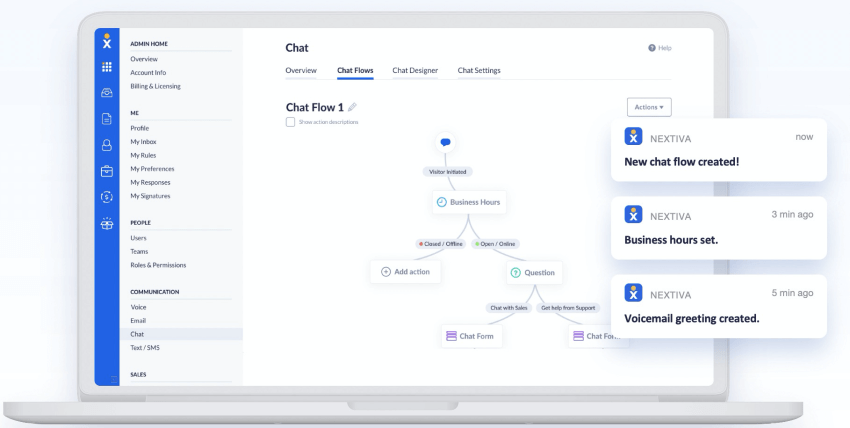
5) Create engaging training materials
Make training materials interactive and easy to digest. Engaging content helps agents absorb information and apply it effectively on the job.
Move beyond long PDFs and create bite-sized microlearning modules, scenario videos, interactive quizzes, webinars, decision trees, and quick job aids such as cheat sheets or one-page playbooks. Use real call clips and annotated transcripts to demonstrate what “good” sounds like. Keep materials modular so you can update individual pieces without rebuilding the entire program.
6) Implement and monitor the program
Implement even the best training carefully and keep refining it. Monitor results closely to improve outcomes over time.
Pilot the program with a small group and collect frontline feedback before expanding it in phases. Hold weekly coaching huddles during the first 60–90 days and conduct monthly reviews to adjust the content and cadence. Treat the program as an evolving process and make small, frequent improvements instead of one major launch.
Track key call center metrics to measure impact and guide improvements, including leading indicators like call center training course completion, quiz scores, and coaching sessions, as well as lagging KPIs such as FCR, AHT, CSAT, NPS, post-training QA scores, average coaching hours per agent, and voluntary turnover.
7) Prioritize agent feedback and coaching
Training is an event, but coaching is an ongoing process. Don’t let new skills fade. Create a regular coaching cadence where managers and agents review performance together using call recordings and metrics. Feedback should be specific, balanced, and future-focused (“Next time, try…”) rather than purely critical. This ongoing loop turns one-time training lessons into lasting behavioral habits and shows agents you’re invested in their long-term success.

Types of Call Center Training Programs
To create a well-rounded and effective training strategy, integrate different training program types:
1) New hire onboarding
This is the basic training every new agent receives to develop them from the ground up into a competent, confident team member. In the first phase, you provide a complete overview of the company’s mission and culture, impart in-depth knowledge of its products and services, and teach the essential skills required for the position. A compelling onboarding program shapes the agent’s entire career within the company.
2) Ongoing training and skill refinement
The learning process doesn’t end after the first few weeks. New products, updated services, and rising customer expectations require continuous training to sharpen agent skills and keep their knowledge up to date. Weekly team meetings to discuss current challenges, monthly workshops on new features, or e-learning modules on updated procedures are some of the ways to refine skills so your entire team is on the same page and knowledge doesn’t become outdated.
3) Soft skills training
While technical knowledge is crucial, an agent’s interpersonal skills significantly determine the customer experience. Soft skills training focuses on developing these essential, human-centered skills. It trains agents to practice empathy, understand a customer’s problems through active listening, and apply creative problem-solving skills. It also covers key techniques such as de-escalating tense situations, building trust, and using positive language to turn a frustrated customer into a loyal one.
4) Technical training
An agent’s effectiveness depends on their ability to use the necessary tools. Technical training keeps the agents competent and confident in using all necessary call center tools. Everything from navigating the customer relationship management (CRM) platform to absoring your call center software’s features, such as call forwarding, conferencing, and wrap-up. The goal is to make the technology feel like an extension of the agent, enabling agents to work efficiently and seamlessly.
5) Compliance training
In many industries, compliance with certain regulations is essential. Compliance training educates employees on these important legal and industry-specific requirements to protect both customers and companies. For example, healthcare employees must be familiar with HIPAA to protect their patients’ privacy, while financial employees must be aware of PCI DSS for handling credit card data. Compliance training ensures that agents can handle every customer interaction securely and legally, minimizing business risks.

Tips and Best Practices for Effective Call Center Training
Strong call center coaching delivers content and creates experiences that help employees learn, adapt, and perform with confidence. Below are some practices that make training programs work in the long run:
Use call center recordings and case studies
Real calls teach lessons that theory can’t. Use call center recordings to analyze both successful and challenging interactions to show what works and what doesn’t. Discuss tone, word choice, and pacing so agents can connect abstract concepts to real outcomes. Case studies help bridge the gap between policy and practice and turn learning into something tangible and relatable.
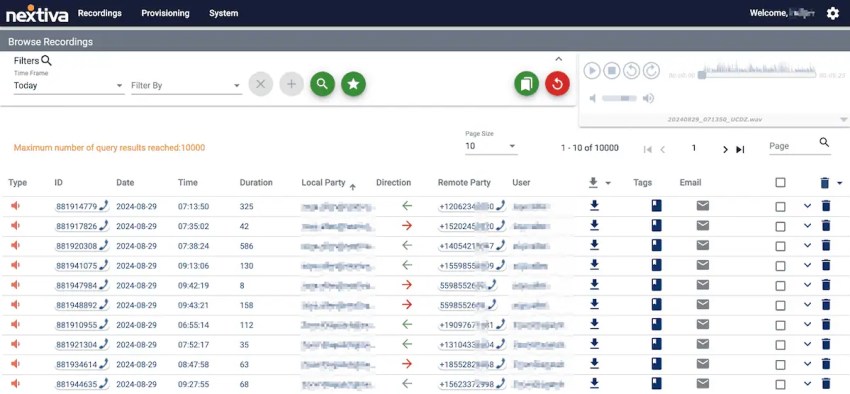
Combine e-learning with live simulations
E-learning builds knowledge, but simulations bring it to life. Role-playing or call simulations let agents practice handling tough scenarios in a safe, controlled environment. Combining digital and experiential learning helps agents build muscle memory, reduce anxiety during live calls, and can internalize best practices more quickly.
Personalize training paths
Every agent learns differently and applies their skills in their own unique way. Use call center performance data and QA insights to identify each agent’s strengths and areas for development and tailor learning plans accordingly. Not everyone receives the same training. That’s why personalized training paths ensure training remains relevant, prevents disengagement, and allows each agent to achieve measurable improvements at their own pace.

Create a collaborative learning environment
Encourage your agents to learn from each other. Peer-to-peer coaching, team meetings, and open discussion forums facilitate knowledge sharing and build trust. When agents share feedback and celebrate successes together, learning becomes a team effort, and this sense of collaboration usually leads to better customer support.
Lead by example
Call center managers set the tone for the entire team. When leaders engage actively in training, give constructive feedback, and model the communication behaviors they expect, agents follow suit. Leadership involvement shows that training is an integral to the company’s culture and success and not just a formality.

How To Measure Your Training Performance
Once a call center training program is in place, the next step is proving its impact. Through the right KPIs, managers can measure agent performance and figure out what’s working, where to improve, and how training contributes to business goals.
Customer satisfaction score (CSAT)
CSAT indicates how satisfied customers are with the service they received. Track post-call survey results to determine whether training leads to improved customer interactions. Rising CSAT scores show that agents are successfully applying their communication and problem-solving skills.
First call resolution (FCR)
FCR measures the frequency with which customer issues are resolved in a single call. A high FCR indicates that agents understand products, policies, and systems, which is a direct result of well-designed training. Continuous improvements in FCR indicate higher agent competency and a better customer experience.
Average handle time (AHT)
AHT includes call time, wait time, and wrap-up time. Call center training should enable agents to complete their tasks productively without rushing the customer. If AHT decreases while quality remains the same, it means that agents are familiar with systems, communication skills, and call center workflows.
Agent satisfaction and engagement
Call center agent training impacts both agent performance and job satisfaction. Measure and manage workforce engagement through surveys, coaching feedback, and attendance rates. Engaged agents tend to stay longer, perform better, and contribute to a positive team culture.
Occupancy rate
The occupancy rate measures the proportion of time agents spend actively handling calls versus waiting for one. Training should improve agent efficiency (like lowering AHT), which allows the team to handle its workload effectively and maintain a healthy, sustainable occupancy rate (typically 85-90%). This ensures agents are productive without being over-utilized, which is a key factor in preventing burnout.
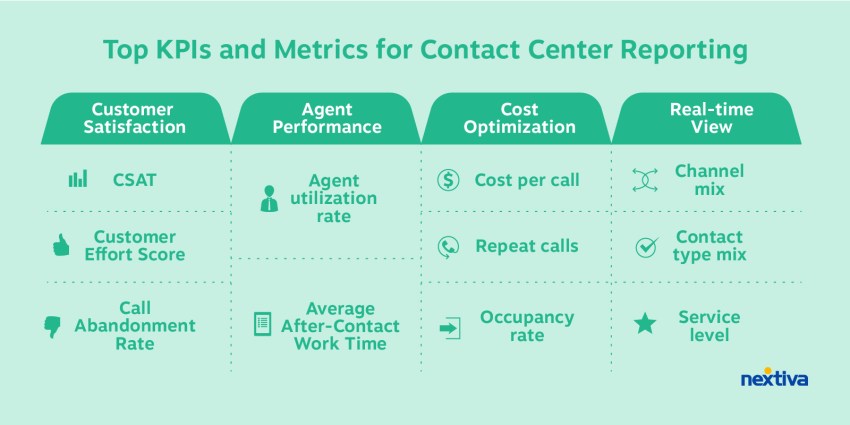
Above All, Pair Your Training With the Right Call Center Platform
Call center training helps you and your teams stay focused and motivated. It boosts your agents’ confidence and helps them improve, which, in turn, reduces their stress and keeps them happy.
By combining your training materials with the right call center software, your teams can better serve their customers. Nextiva’s AI-powered contact center solution does just that and more. It identifies trends and enables you to take data-driven action before it’s too late to correct course. It also provides real-time insights into calls, frequency, quality, customer feedback, and other key performance indicators, streamlining contact center management through a unified communications dashboard.
Your complete call center solution.
Nextiva’s contact center management system simplifies your team’s workflow and makes your customers’ experiences truly remarkable.
Call Center Training FAQs
Training and coaching are related but distinct. Training is a structured event focused on teaching new knowledge or skills (e.g., “Here is how to use our new CRM,” or “This is the compliance script”). Coaching is an ongoing, personalized process focused on refining and applying those skills in real-world scenarios (e.g., “I listened to your call, let’s talk about how you handled that CRM entry while managing the customer’s objection”).
Excellent communication (both verbal and written), empathy, patience, problem-solving, and the ability to remain calm under pressure are some of the most important skills call center agents should have.
Call center training should be an ongoing process. New hires should receive complete onboarding, and all agents should receive regular, ongoing training to keep their skills sharp and stay up-to-date on new products and procedures.
A blended learning approach that combines e-learning, classroom-style training, and hands-on practice is typically the most effective. The best training is also personalized to the individual agent’s needs.


















 Customer Experience
Customer Experience 







